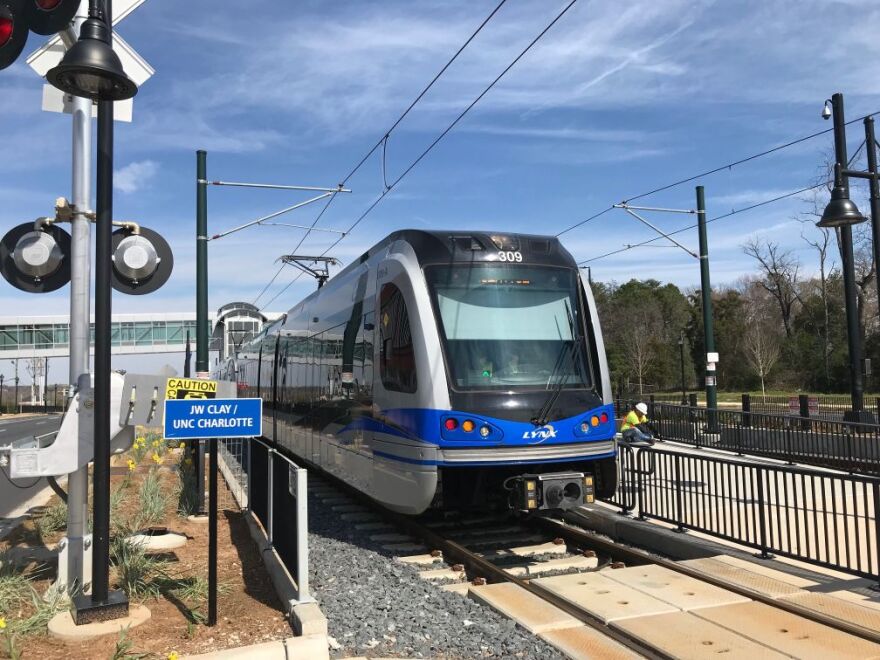After years of talking about the need for greater regional cooperation on transit, local leaders now say they want to formalize such an arrangement by creating a regional transit authority.
A transit authority would be a governmental body that could span several counties in the Charlotte region, with its own budget and enhanced power to coordinate bus service. Local leaders also view it as a potential prelude to enhanced light rail service, as the city of Charlotte’s plans to build new rail lines are hung up on questions of funding.
In a speech on Monday at the South Charlotte Partners Regional Transportation Summit, Charlotte Mayor Vi Lyles spoke in her most specific terms yet about how such an authority might work.
“We all have to acknowledge that an authority is in our future,” Lyles said. “If we’re going to have a regional system, it has to have regional representation, and we know that. But at the same time, we have to really consider how we handle debt and allocate representation of services that operate and how we add new services.”
In a later interview with Transit Time, Lyles said there are still “a lot of details to work through, but [on] the overall concept, there is significant consensus right now.”
It is unclear precisely how a Charlotte-area regional transit authority might work, how big it might be and how much power it might wield. It might require legislative approval, though state law provides for the creation of transit authorities if at least three counties agree to form one. Transit authorities are common in large metro areas and are a way for multiple cities, towns and counties to make coordinated instead of piecemeal decisions.
Significant questions could include how much control towns and counties outside of Charlotte might be willing to surrender to a larger regional entity, and how revenue and costs would be allocated.
Ron Pappas, the mayor of Waxhaw in Union County, chairs a regional transit board and says too often, there’s “too much silo-building” among different local governments. “Sometimes, it’s like herding cats,” he said. Asked about the possibility of an authority, he said, “We need it,” but acknowledged the questions are complex.

For Charlotte, the consideration of a regional authority marks an evolution of its thinking on transit — and a tacit acknowledgment that its plan to build a light rail line is stuck. Its $13.5 billion plan, formulated in 2020 and called “Charlotte Moves,” envisions adding an east-west light rail line plus a commuter rail line to northern Mecklenburg, paid for with a Mecklenburg sales tax increase of 1%.
But Republican legislative leaders in Raleigh seem disinclined to help pay for that plan or to allow for a vote to raise the sales tax, and they have said they prefer road-building to expensive trains. Working more closely with surrounding towns and counties — many of them with Republican elected leaders — might help advance Charlotte’s interests in Raleigh.
It could also mean giving up control of the Charlotte Area Transit System (CATS) — which is now run as a Charlotte department — to a regional governing body. A panel of local elected leaders called the Metropolitan Transit Commission has some limited oversight over CATS, but some of its members from towns outside Charlotte have said the city wields too much power and sometimes isn’t collaborative. CATS’ CEO reports to Charlotte’s city manager.
Tony Lathrop, a board member of the N.C. Department of Transportation, said in an interview that an authority could start as simply as coordinating marketing and branding under a single regional umbrella, then add pieces over time.
“The goal is to start that conversation,” he said.
Other urban areas in North Carolina have transit authorities:
- The Western Piedmont Regional Transit Authority, also known as Greenway Public Transportation, offers van and bus services in four counties in the Hickory area.
- The Research Triangle Regional Public Transportation Authority, also known as GoTriangle, offers bus service in Durham, Wake and Orange counties. Its money comes from sources including vehicle registration fees, a rental car tax and a half-cent sales tax for transit.
Ed Driggs, who chairs the Charlotte City Council’s transportation committee, said the next step is for a regional organization called the Centralina Regional Council to study the possibilities and develop recommendations, which he said he expects by the end of the year.
“What will happen is we will establish that authority. We will move forward,” he said.
But he warned the audience that even under the best-case scenarios, building rail will take about 20 years for design, property acquisition and construction.
“It will take years,” Driggs said. “… I’m optimistic we will be in a much better place than we are right now.”
Tony Mecia is executive editor of The Charlotte Ledger. Reach him at tony@cltledger.com.


